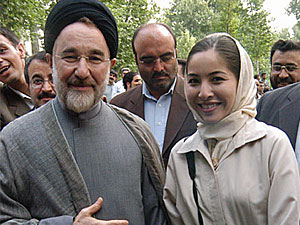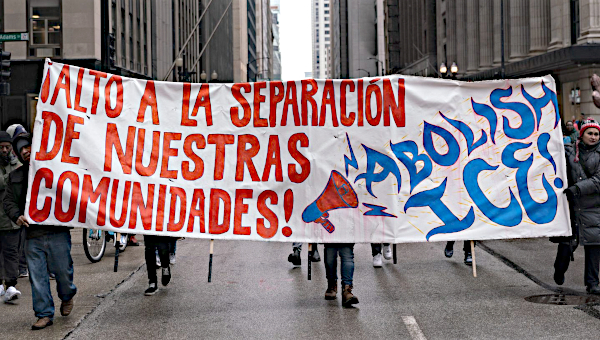
Good old, better days?
Roxana Saberi's case has by now become internationally known: the photogenic, as-of-today-32-year old Iranian-American journalist, who for the six years before her arrest in January had been freelancing in Iran, reporting for different agencies including the BBC and the NPR. She was arrested in January, and after a closed-door summary 'trial', was sentenced to eight years in prison on espionage charges. As of Saturday, April 25, 2009, Saberi's father has reported that her daughter has been on hunger strike for five days, to protest her imprisonment and the charges brought against her.
The Iranian President Ahmadinejad along with the head of the judiciary, Ayatollah Mahmoud Shahroudi, have since made public announcements, urging the relevant courts to play fair with Ms. Saberi's case and to allow her all the legal means available to her by law, including the chance for a fair defense.
Iran's Nobel Laureate Shirin Ebadi announced recently that she would represent Saberi in her appeal of the espionage charges and the eight-year sentence.
As reported by Inter Press Service, "The former beauty queen – Saberi was the 1997 "Miss North Dakota" – was arrested in January and initially accused of trying to buy wine, later of lacking valid press credentials, and finally with espionage," (Int'l. Support Mounts for Jailed Journalist, IPS/April 21, 2009). This summary of the rapid evolution of her alleged 'crime' should be enough to evince the spurious nature of the charges brought against her, and is a great example of the sham called 'judiciary' in Iran.
There are speculations regarding:
1) whether or not some conservative elements are using their tentacles within the judiciary to pick on Saberi so as to stick a crowbar in the wheels of the advocates of normalization with the U.S. Very possible.
2) whether or not Saberi's case is a show of toughness by some who need to showcase their credentials in the coming elections, in June. Possible, but a week explanation.
It could also be a manufactured case so as to have something for the Iranian government with which to show their 'high intentions and good will'. My guess is Saberi will be released as a 'show of good will'. (Naturally, it would be very dreadful if things came to a situation where I would have to eat those words!)
Another case, that of Hossein Derakhshan, is equally indicative of how politicized the Iranian judiciary is. Derakhshan is known as the 'godfather of blogging in Iran' (under the blogger name, Hoder). His politics is pretty much aligned with the reformists' platform, though he has also written approvingly of Ahmadinejad's policies (see his blog here).
Yet, he has been in detention since November 2008. The charge against him is quite an unfounded one of spying for Israel. The apparent reason for his being in prison is a trip to Israel in 2006 on his Canadian passport, to build 'people-to-people' understanding between the two countries, a trip used by the authorities as the excuse to bring the espionage charges. It must be said that additional motivation for bringing such absurd charges against him could have been provided by Derakhshan's ideas for some very mild reforms for more free expression than currently allowed, and his gentler criticisms of the wilder aspects of the theocratic-obsessive policies of the state.
In his letter to urge the head of the Iranian judiciary to ensure fairness in dealing with Roxana Saberi's case, President Ahmadinejad asked that the case of Derakhshan also be looked into with more care, thus extending his good will to those who in the past have spoken kindly of his policies.
[Note: My reference here to Derakhshan's expressed support for some of Ahmadinejad's policies is in no way to be taken as implying that he 'got his just deserts', or anything as obscene as that; not at all. Nobody should be jailed based on ideas they express. Whether or not Derakhshan exercised good political foresight, or whether or not he should have/could have spoken in defense of other, more radical political prisoners in Iran when he had a large platform ... all those things are completely beside the point and have absolutely nothing to do with his unqualified right to free speech. The point here is to establish that in Iran even political non-foes are not spared the random brutality of the 'justice' system.]
Be that as it may, 'good will' toward the Iranian people is a torturous joke and, from the government side, in very scarce supply. Especially when it comes to other prisoners held purely on political grounds: women's rights activists, labor unionists, student activists, socialists and radical democrats, national-minority rights activists (mostly Kurdish, Azeri and some Arabs) or ... and this one takes the cake ... blasphemers. That's right, apostates and blasphemers. Iranian socialists are obliged to repeatedly remind western readers and followers of things Iranian that for the past thirty years in our country, if a judge really wants to, he can throw the charge of 'fighting against God' (in Farsi, 'Moharebeh baa Khoda') at anybody he wishes.
Now, pardon me for asking, but isn't it really presumptuous for any human agency, and more so for a religious-based one, to imply that God cannot take care of himself in a fight against a mere human being? But, I guess lucky and convenient for God, the Iranian mullahs have the charge in their books, and lucky for the mullahs it must be very helpful in putting the lid on undesirable advocacy by any kept under the thumb of the state.
In his letter to urge the head of the Iranian judiciary to ensure fairness in dealing with Roxana Saberi's case, President Ahmadinejad asked that the case of Derakhshan also be looked into with more care, thus extending his good will to those who in the past have spoken kindly of his policies.
[Note: My reference here to Derakhshan's expressed support for some of Ahmadinejad's policies is in no way to be taken as implying that he 'got his just deserts', or anything as obscene as that; not at all. Nobody should be jailed based on ideas they express. Whether or not Derakhshan exercised good political foresight, or whether or not he should have/could have spoken in defense of other, more radical political prisoners in Iran when he had a large platform ... all those things are completely beside the point and have absolutely nothing to do with his unqualified right to free speech. The point here is to establish that in Iran even political non-foes are not spared the random brutality of the 'justice' system.]
Be that as it may, 'good will' toward the Iranian people is a torturous joke and, from the government side, in very scarce supply. Especially when it comes to other prisoners held purely on political grounds: women's rights activists, labor unionists, student activists, socialists and radical democrats, national-minority rights activists (mostly Kurdish, Azeri and some Arabs) or ... and this one takes the cake ... blasphemers. That's right, apostates and blasphemers. Iranian socialists are obliged to repeatedly remind western readers and followers of things Iranian that for the past thirty years in our country, if a judge really wants to, he can throw the charge of 'fighting against God' (in Farsi, 'Moharebeh baa Khoda') at anybody he wishes.
Now, pardon me for asking, but isn't it really presumptuous for any human agency, and more so for a religious-based one, to imply that God cannot take care of himself in a fight against a mere human being? But, I guess lucky and convenient for God, the Iranian mullahs have the charge in their books, and lucky for the mullahs it must be very helpful in putting the lid on undesirable advocacy by any kept under the thumb of the state.







No comments:
Post a Comment